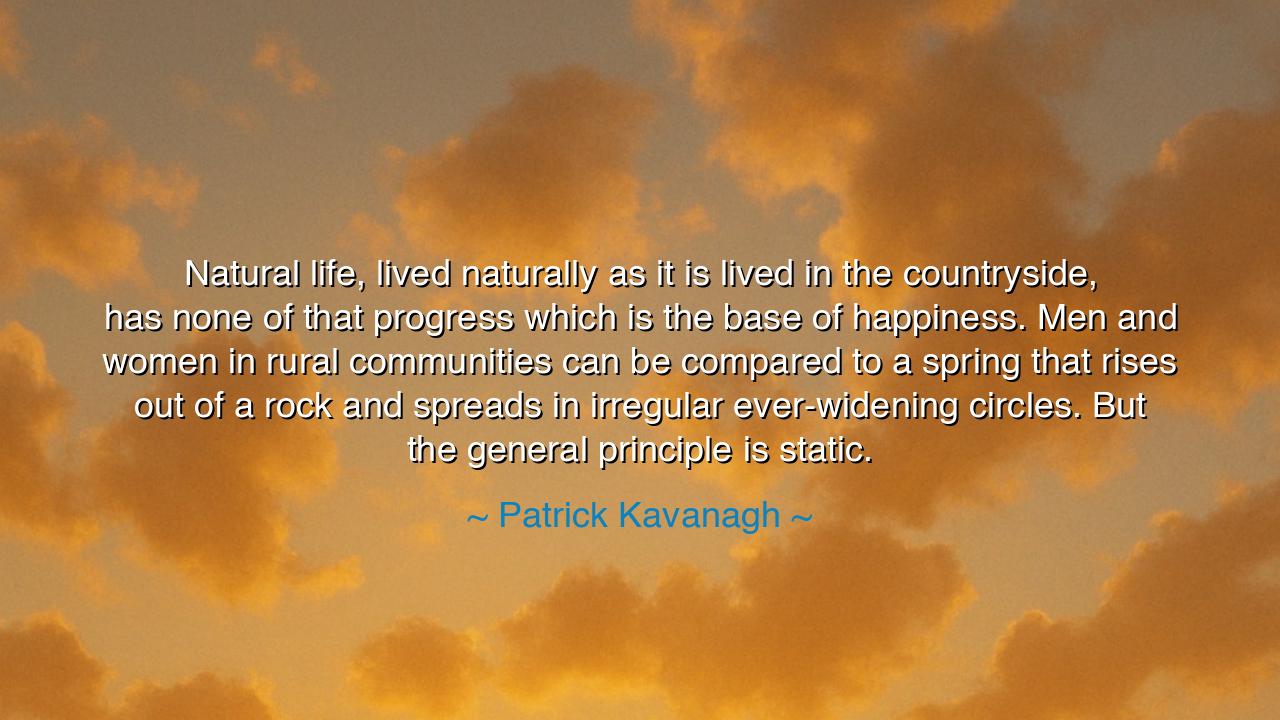
Natural life, lived naturally as it is lived in the countryside
Natural life, lived naturally as it is lived in the countryside, has none of that progress which is the base of happiness. Men and women in rural communities can be compared to a spring that rises out of a rock and spreads in irregular ever-widening circles. But the general principle is static.






In the words of Patrick Kavanagh, “Natural life, lived naturally as it is lived in the countryside, has none of that progress which is the base of happiness. Men and women in rural communities can be compared to a spring that rises out of a rock and spreads in irregular ever-widening circles. But the general principle is static,” we hear the reflective voice of one who has walked the furrows of both field and thought. It is a meditation on the rhythm of nature, the stillness of rural life, and the human yearning for progress — that restless spark which drives civilization forward. Kavanagh, the Irish poet whose soul was rooted in the soil yet hungered for transcendence, understood both the beauty and the burden of simplicity. His words rise from the tension between the serenity of the countryside and the ceaseless striving of the human heart.
The origin of this quote lies in Kavanagh’s own life — a man of the land who became a man of letters. Born in County Monaghan, he grew up among farmers and villagers whose lives were bound by the turning of the seasons and the sameness of days. To live in such a place was to live in rhythm, not in revolution. Yet, as Kavanagh observed, this natural life, though peaceful, lacked the progress that nourishes the imagination and the soul’s evolution. The countryside was a place of continuity, of circular growth like a spring widening upon the earth — but it was not a place of transformation. Its beauty was eternal, but its spirit, static.
And yet, Kavanagh did not scorn it. His was not the voice of contempt but of lament. He saw that in the stillness of rural life there dwelled purity and innocence, yet also stagnation — the soul’s hunger for change unmet. To live only among fields is to learn contentment, but sometimes at the cost of aspiration. The villagers, bound to their farms and traditions, did not seek to create, to invent, to dream beyond the horizon. They lived “naturally,” as the earth itself lives — in cycles, without seeking meaning beyond survival. But the poet, the seeker, the artist — they crave movement, the restless unfolding of the mind toward something greater.
This reflection is echoed in the story of the ancient Greeks, whose early pastoral societies gave birth to one of the world’s greatest cultures. In their beginning, they too were bound to the land, tilling soil beneath quiet skies. But from that stillness arose a yearning — the desire to know the stars, to question the gods, to build cities of marble and ideas. They broke from the static circle of the countryside and sought the linear path of progress. Their philosophy, their art, their democracy — all were born from the tension between nature’s simplicity and the mind’s need to create. So too, Kavanagh felt this pull: the desire to rise from the spring of tradition and flow toward the sea of possibility.
But there is wisdom even in the static principle he describes. For though progress is the base of happiness, it is not the whole of it. The spring that does not flow outward still nourishes what surrounds it. There is holiness in the simple life — in the slow growth of crops, the unchanging village, the familiar hills. It is a kind of happiness untouched by ambition — the peace of being rather than becoming. Yet Kavanagh reminds us that man is not meant to remain only as the spring; he must also be the river, widening, deepening, reaching toward the unknown. To remain entirely static is to deny the creative pulse that defines us as human.
In his own life, Kavanagh embodied this struggle. He left the countryside to seek his voice in Dublin, yet his poetry never left the soil. He carried the fields of Monaghan within him — the stillness, the sorrow, the beauty — and from them he drew his greatest work. He learned that the poet’s progress is not measured in wealth or fame, but in the transformation of understanding: to see the world as both simple and profound, to reconcile movement with stillness. In that balance lies wisdom.
Thus, the lesson of Kavanagh’s words is not to reject the countryside, nor to idolize progress, but to unite them. Live with the peace of nature, but let the fire of curiosity burn within. Be the spring, pure and grounded, yet let your waters seek the sea. For happiness is not found in idleness, nor in endless striving, but in the sacred marriage of contentment and growth.
So, to those who hear this teaching: do not let your life become static. Do not mistake comfort for fulfillment. Cultivate the calm of the countryside in your heart, but never cease the journey of the mind. For as Kavanagh knew, the true joy of life is not in remaining where you are, but in becoming — ever-flowing, ever-reaching, like a spring that rises from the rock and finds its way, at last, to the boundless sea.






AAdministratorAdministrator
Welcome, honored guests. Please leave a comment, we will respond soon